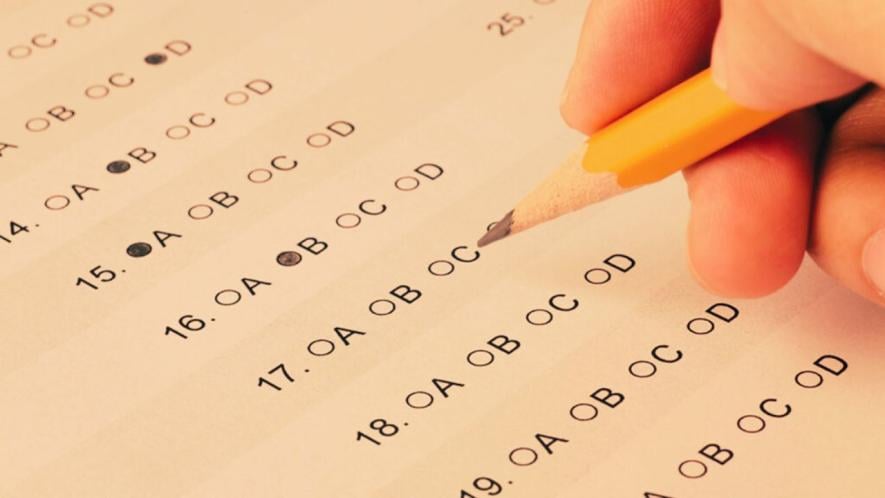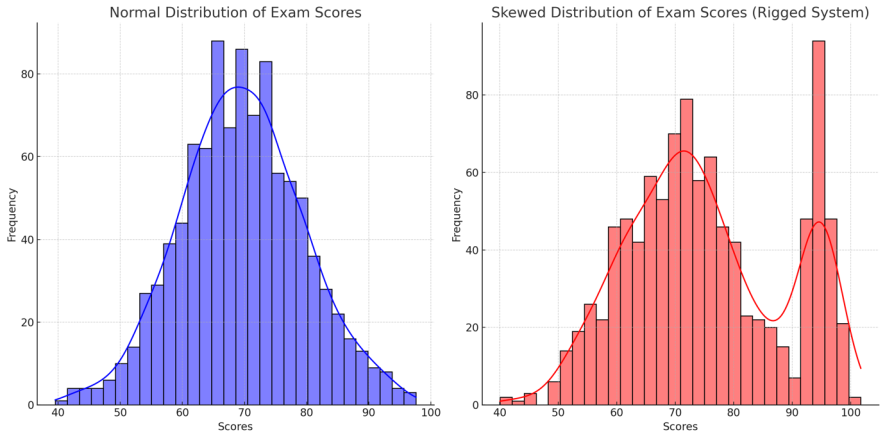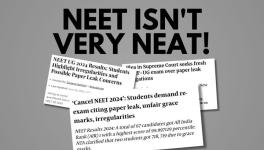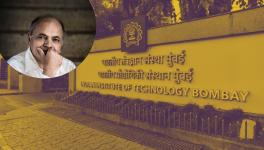Meritocracy to Moneyocracy: Unseen Costs of Exam Fraud

Representational Image. Image Courtesy: Flickr
The repeated examination scams have laid bare the profound flaws within India's examination and selection processes, revealing a system deeply entrenched in corruption. This scandal not only highlights the failure of authorities to uphold meritocracy but also showcases the severe implications of such systemic corruption, particularly detrimental for economically weaker sections of society.
What we are discussing here is a form of systemic corruption. It refers to the pervasive and deep-rooted nature of corrupt practices within the structures and institutions of a society. Involving not just isolated incidents but a network of corrupt activities that influence fundamental processes, policies, and outcomes across various levels of an organisation or system.
By definition this type of corruption involves multiple actors and mechanisms, leading to widespread manipulation, unfair practices, and significant socio-economic impacts, particularly disadvantaging marginalised and economically weaker sections of society. Systemic corruption undermines the integrity, trust, and effectiveness of institutions, perpetuating inequality and hampering development.
When systemic corruption persists, it widens the gap between the rich and the poor. Wealthy individuals can secure top positions and opportunities through financial means, while those from economically weaker backgrounds are left behind despite their potential and hard work, depriving hardworking and deserving students of their rightful places in educational institutions. This growing divide perpetuates a cycle of poverty and inequality, making it increasingly difficult for the poor to break free from their disadvantaged positions.
The integrity of the educational system is compromised when corruption is rampant. The NEET scam has led to widespread skepticism about the fairness of examination and admission processes. This erosion of meritocratic principles undermines the trust that students and parents place in the system, leading to disillusionment and a belief that success can be bought rather than earned through hard work and talent.The long-term impact includes a loss of potential contributions from bright individuals, hindering national development and progress, undermining the efforts of countless diligent candidates, reinforcing the notion that the system can be manipulated by those with the means to do so.
Furthermore, the shift in the conduct of exams from university employees and government officials to an agency like the National Testing Agency (NTA) has exacerbated the problem.University employees and government officials, who traditionally oversaw these examinations, often had higher salaries, a sense of accountability, and respect for their positions. In contrast, the NTA employs low-paid, low-accountability staff, which has created fertile ground for corruption.
The diminished oversight and lack of stringent checks that characterise the NTA’s operations have on one hand compromised the lives and careers of countless students, significantly weakening the integrity and reliability of the system, making it more susceptible to fraud and malpractices. While on the other hand, it clearly shows that privatisation is not a single-stop solution to all the problems. It reinforces the fact that merit goods and like education and health can not be left in private hands. The state needs to remain accountable for them.

Consider the graphs presented above, In a fair and unbiased examination system like NEET or NET, the scores of the students would typically follow a normal distribution. Implying that most students would score around the average mark while there would be relatively few students who score very high or very low. This results in a bell-shaped curve when plotting the scores, indicating a fair competition where students' scores are based on their true ability and preparation.
However, if some students had access to exam questions beforehand, the distribution of scores would be significantly different; students with advance access to questions would score unusually high. This results in a skewed distribution, where all such students achieve top scores, distorting the normal bell curve. Generating a double peak that indicates that the system has been compromised, as such a concentration of high scores is not natural.
A significant concern of this double bell is that undeserving candidates, who manipulate their way into the system by accessing examination questions in advance, secure top ranks and gain admission to prestigious institutions known for their academic excellence. These institutions expect high standards and academic prowess from their students.
However, since these candidates achieved their positions through dishonest means rather than genuine academic merit, they are likely to resort to further manipulation to overcome academic challenges and exams. This allows them to continue obtaining higher grades and ranks than they deserve, while truly deserving students are forced to accept lower ranks, lower-paying jobs, and diminished morale.
Besides perpetuating a cycle where merit and hard work are overshadowed by deceit and corruption, leading to a demoralised and under-utilised workforce, such scams lead to a significant rot of educational institutions, starting with the most prestigious ones. The normalisation of corruption among these students fosters a culture of dishonesty, making cheating and other fraudulent practices widespread. As a result, the reputation of these top institutions, built on years of academic excellence, suffers.
Employers and academic peers lose trust in the value of degrees awarded by these institutions, affecting their graduates’ career prospects. Additionally, genuinely deserving students, who gain admission based on merit, become demoralised seeing their dishonest peers succeed, leading to decreased motivation and engagement.
Over time, this ongoing cycle of corruption weakens the institution’s influence, reduces funding, and diminishes research output, perpetuating its decline and further eroding its standing in the academic and professional communities.
The consequences of such corruption are dire. When deserving students from lower economic backgrounds are denied opportunities, their potential is wasted, which hampers both individual growth and societal progress. The nation loses out on brilliant minds who could contribute significantly to its development.
Furthermore, the decreased trust in educational institutions can lead to a decline in the quality of the workforce, ultimately impacting economic development. To mitigate the impacts of systemic corruption like the NEET scam and the NET UGC paper leak, several measures need to be implemented, robust oversight and transparent processes are crucial in preventing and detecting fraudulent activities. This includes regular audits, independent monitoring bodies, and strict enforcement of anti-corruption laws.
Transparency in the examination and selection processes is necessary for fair conduct and evaluation. Making information publicly accessible and ensuring that procedures are open to scrutiny can deter corrupt practices. Holding government officials accountable for the results of their actions is also essential in combating corruption. This involves not only legal penalties but also administrative actions such as suspensions and dismissals for those found guilty of corrupt practices or of taking decisions that lead to malpractices. Educational institutions and authorities must promote a culture of integrity and ethical behaviour which can be achieved through education, public awareness campaigns, mass mobilisation etc.
The NEET scam and the NET-UGC paper leak are stark reminders of the pervasive and damaging effects of systemic corruption. By understanding their impacts, the inequality of impacts and the damages it cause, and by implementing comprehensive anti-corruption measures, we can work towards a fairer and a just educational system that values merit and hard work over deceit and financial power. This is important to ensure that every deserving student, regardless of their economic background, has the opportunity to succeed and contribute to the nation’s progress.
The authors are associate professors at the Zakir Husain Delhi College, University of Delhi. The views are personal.
Get the latest reports & analysis with people's perspective on Protests, movements & deep analytical videos, discussions of the current affairs in your Telegram app. Subscribe to NewsClick's Telegram channel & get Real-Time updates on stories, as they get published on our website.
























